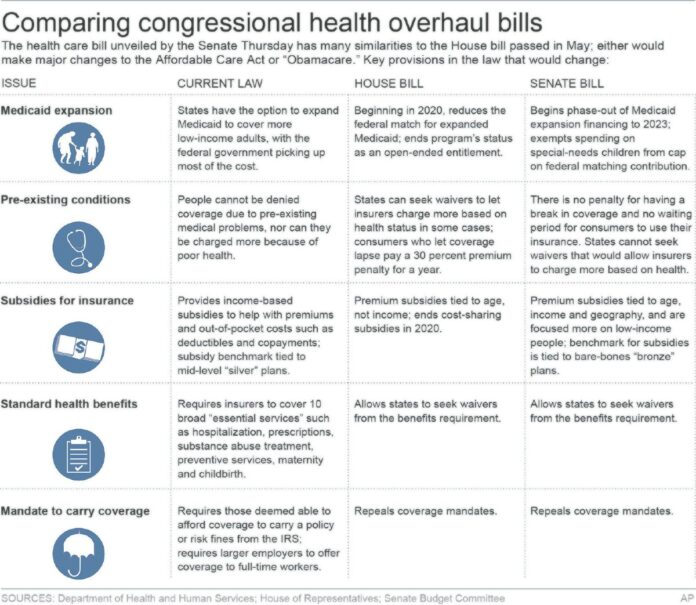Depending on the political winds at the moment, the U.S. Senate may or may not vote this week on a bill that supporters say will repeal and replace the Affordable Care Act, commonly and often derisively known as Obamacare.
If Senate Republicans are successful in getting this legislation passed, the bill must still be reconciled with a version that the U.S. House passed in May.
In short, the debate over the future of health care in this country is not likely to go away anytime soon.
And while we will delay passing judgment on the Senate bill, which was made public for the first time last week, we do offer a warning: citizens should educate themselves on this critical public policy debate.
Congress intends to make sweeping changes to the manner in which health care is delivered and paid for in this country and those changes will have a direct impact on all of our wallets; as direct an impact as local tax rates affect consumers.
The problem is that supporters and opponents of this legislation are already spending millions of dollars to sway your opinion about the virtues or the evils of this legislation.
And because many millions of dollars more will eventually be at stake for these special interests, the talking points that they come up with will be confusing, contradictory and often concocted to spin public opinion.
We urge people not to fall for it. And the best way to protect ourselves from an onslaught of propaganda from both sides of the debate is to educate ourselves about the general proposals on the table.
It could be as simple as studying the graphic on this page that highlights existing law and compares that with proposed changes by both the House and Senate.
For those who are more ambitious, we would even recommend reading through some or all of the text of the Senate bill.
Determine what is important to you as a healthcare consumer and explore what may or may not change that affects the priorities that you set.
In this region in which diabetes is an epidemic, for example, it would be worth exploring what the implications of the debate over pre-existing conditions would mean under the Senate or House version as compared to existing law as it relates to the treatment of diabetes.
For those of us with children in college, would the existing mandate that insurers must cover dependents up to age 26 change under congressional proposals?
And, in what is already proving to be one of the most confusing components of the Senate proposal, what are the implications for Medicaid? And how would that affect us as we age?
The theory behind having a healthy democracy is the notion that members of Congress have been placed in office by us to represent our interests. If we agree with Congress on the need to change Obamacare, we should let them know — just as we should voice our discontent if we disagree.
But that’s the catch: A healthy democracy obligates the American citizen to educate himself or herself on the issues. When something as important as health care is up for debate, it’s not enough to take a position because one party or the other dictates that position. We should take a position because it’s the right choice for our situation.
Our healthcare system has major problems. Of that, there should be no dispute.
The question is how do we fix those problems? Does it require a wholesale repeal of existing law or are there opportunities to fix those things we dislike about the current system and keep those things that we do like?
Only by framing the questions in that fashion — as opposed to making this a Democratic or Republican thing — can we smartly address one of the major public policy challenges of our time.
Congress can be persuaded to react smartly to our concerns provided that we demand good policy instead of win-at-all-costs politics.





